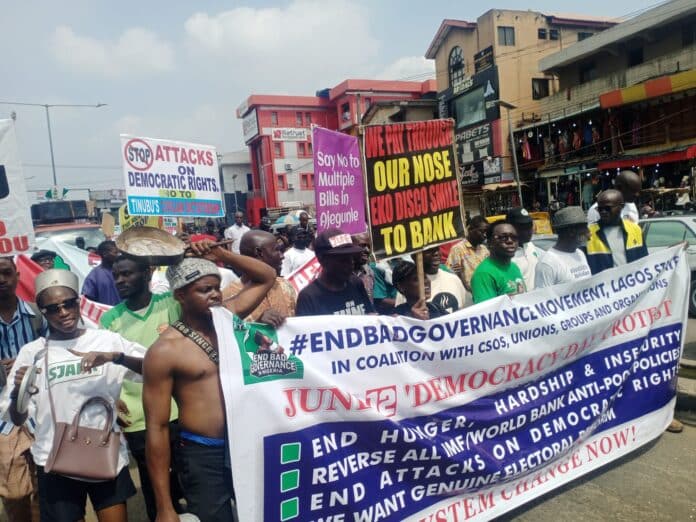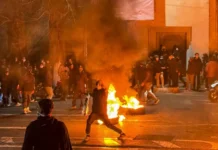A resounding success, June 12 reaffirmed the need for continued mass action against the ruling elite and for the building of a revolutionary working-class alternative rooted in socialist ideas
Movement for a Socialist Alternative (ISA in Nigeria)
(This article was first published on 16 June 2025)
To mark the 32nd anniversary of the historic June 12 uprising and to protest the worsening socio-economic crisis under the Bola Ahmed Tinubu regime, the Movement for a Socialist Alternative (MSA) joined forces with others in the #EndBadGovernance movement for a mass demonstration in Lagos.
The protest was a bold display of resistance against hunger, hardship, and the anti-people, pro-capitalist policies being implemented by the Tinubu-led government. The demonstration began at 8:00 a.m. at the Ikeja Under-Bridge convergence point and ended around 1:00 p.m. at the Ojota Bus Stop.
Despite the peaceful and well-organized nature of the protest, demonstrators faced intimidation and harassment from state agents who attempted to infiltrate the movement. In addition, thugs sponsored by the ruling party hired a crowd to stage a fake celebration in support of the current government, while also a heavy presence of security operatives further tried to demoralise the movement. Shockingly, even with the Lagos State Commissioner of Police present and surrounded by armed officers, APC thugs attempted to violently disrupt the protest. Rather than intervene, the police turned a blind eye, choosing to ignore the threats and intimidation being faced by citizens exercising their democratic rights.
However, the discipline and preparedness of the protesters enabled them to resist the attacks and continue the demonstration without retreat. Protesters maintained high morale with spirited chants, revolutionary solidarity songs, and conscious music from legends like Fela Anikulapo Kuti and Eedris Abdulkareem. These musical renditions energized the march, reinforcing the theme that “revolution is the festival of the oppressed.”
The protest drew between 200 to 300 participants, including activists, students, workers, and members of the general public affected by the harsh economic realities in the country. Leaders from various organisations addressed the crowd, emphasising the urgent need to resist fuel subsidy removal without alternatives, currency devaluation, commercialisation of education, and the increasing repression of dissent.
MSA recorded the participation of fifteen comrades and sympathizers in the march. During the protest, the organization sold a total of 56 copies of its publication, Solidarity, and engaged with several protesters who expressed interest in the group’s activities.
Overall, the June 12 protest was a resounding success, both in terms of its political messaging and organisational outreach. It reaffirmed the need for continued mass action against the ruling elite and for the building of a revolutionary working-class alternative rooted in socialist ideas.




